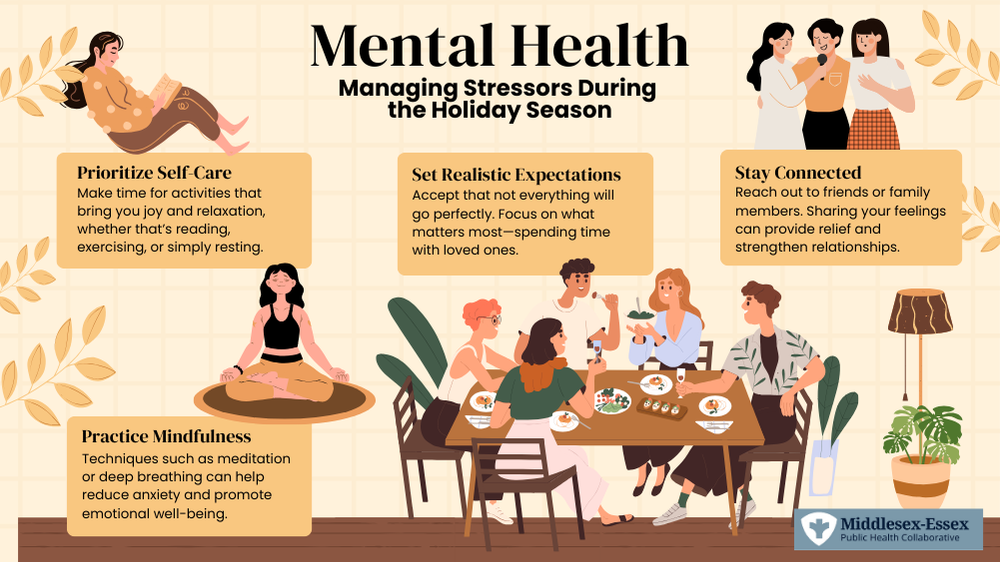Mental Health & Stressors during the Holiday Season
December 12, 2024
As we transition into winter, many of us face the challenges that come with shorter days and the stress of the holiday season. The decrease in sunlight can lead to feelings of sadness or anxiety, and the pressure of holiday expectations can exacerbate these feelings. This December, it's crucial to focus on mental health awareness and explore available resources, especially here in Massachusetts.
Understanding Seasonal Affective Disorder (SAD)
Seasonal Affective Disorder (SAD) is a type of depression that typically occurs during the fall and winter months when daylight hours are shorter.
Symptoms may include:
-
- Low energy and fatigue
- Difficulty concentrating
- Changes in appetite or weight
- Feelings of hopelessness or sadness
If you find yourself experiencing these symptoms, you’re not alone. It’s essential to recognize them and seek support.
Managing Holiday Stress
The holiday season can bring joy but also significant stress.
Common stressors include:
-
- Financial pressures: The cost of gifts, travel, and festivities can be overwhelming.
- Family dynamics: Spending time with family can be both joyful and stressful, especially if there are unresolved conflicts.
- Unrealistic expectations: The desire to create a perfect holiday experience can lead to burnout.

To manage holiday stress, consider these tips:
- Set Realistic Expectations: Accept that not everything will go perfectly. Focus on what matters most—spending time with loved ones.
- Prioritize Self-Care: Make time for activities that bring you joy and relaxation, whether that’s reading, exercising, or simply resting.
- Practice Mindfulness: Techniques such as meditation or deep breathing can help reduce anxiety and promote emotional well-being.
- Stay Connected: Reach out to friends or family members. Sharing your feelings can provide relief and strengthen relationships.
Mental Health Resources in Massachusetts
If you or someone you know is struggling with mental health issues, there are resources available in Massachusetts to help:
- Massachusetts Department of Mental Health: Offers comprehensive services and support for individuals with mental health needs. Visit their website for information on local programs and services.
- National Alliance on Mental Illness (NAMI) Massachusetts: Provides education, support groups, and resources for individuals and families affected by mental illness. They offer a helpline for immediate assistance.
- Crisis Text Line: Text "HOME" to 741741 for free, 24/7 support. Trained crisis counselors are available to listen and help.
- Local Community Health Centers: Many health centers across Massachusetts offer mental health services, including counseling and support groups. Check with your local center for specific offerings.
- Therapy and Counseling: Consider reaching out to a licensed therapist or counselor for support. Many providers offer telehealth services, making it easier to access care from home.
As we navigate the shorter days and the complexities of the holiday season, prioritizing mental health is more important than ever. Acknowledge your feelings, seek support, and utilize the resources available in Massachusetts. Remember, it’s okay to ask for help, and taking care of your mental health is a vital step toward overall well-being. Let’s work together to create a supportive community that prioritizes mental health for everyone this season.